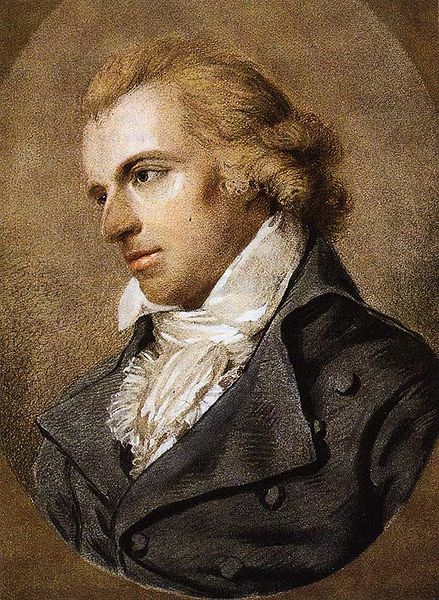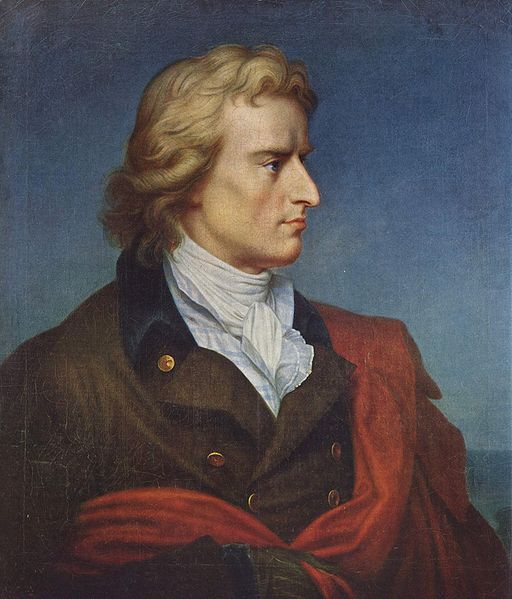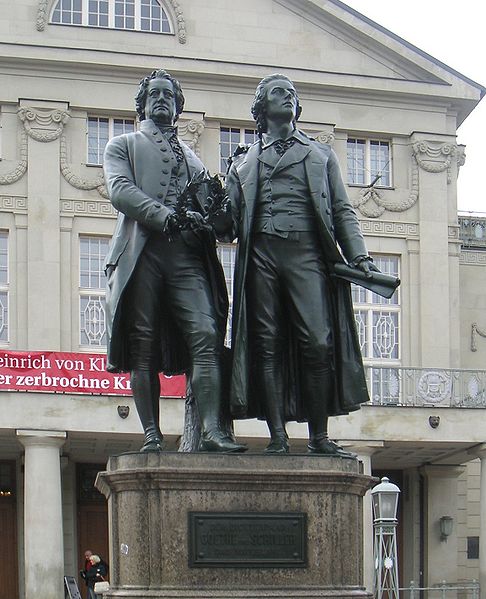<Back to Index>
- Aircraft Designer Andrei Nikolayevich Tupolev, 1888
- Playwright Johann Christoph Friedrich von Schiller, 1759
- Leader of the Reformation Martin Luther, 1483
PAGE SPONSOR



Johann Christoph Friedrich von Schiller (10 November 1759 – 9 May 1805) was a German poet, philosopher, historian, and playwright. During the last seventeen years of his life (1788 – 1805), Schiller struck up a productive, if complicated, friendship with already famous and influential Johann Wolfgang Goethe. They frequently discussed issues concerning aesthetics, and Schiller encouraged Goethe to finish works he left as sketches. This relationship and these discussions led to a period now referred to as Weimar Classicism. They also worked together on Die Xenien, a collection of short satirical poems in which both Schiller and Goethe challenge opponents to their philosophical vision.
Schiller was born on November 10, 1759, in Marbach, Württemberg, as the only son of military doctor Johann Kaspar Schiller (1733–96), and Elisabeth Dorothea Kodweiß (1732–1802). They also had five daughters. His father was away in the Seven Years' War when Friedrich was born. He was named after Frederick II of Prussia, the king, but he was called Fritz by nearly everyone. Kaspar Schiller was rarely home during the war, but he did manage to visit the family once in a while. His wife and children also visited him occasionally wherever he happened to be stationed. When the war ended in 1763, Schiller's father became a recruiting officer and was stationed in Schwäbisch Gmünd. The family moved with him. Due to the high cost of living — especially the rent — the family moved to nearby Lorch. Although the family was happy in Lorch, Schiller's father found his work unsatisfying. He sometimes took his son with him. In Lorch, Schiller received his primary education. The quality of the lessons was fairly bad, and Friedrich regularly cut class with his older sister. Because his parents wanted Schiller to become a pastor, they had the pastor of the village instruct the boy in Latin and Greek. Pastor Moser was a good teacher, and later Schiller named the cleric in his play Die Räuber after him. As a boy, Schiller was excited by the idea of becoming a cleric and often put on black robes and pretended to preach. In 1766, the family left Lorch for the Duke of Württemberg's principal residence, Ludwigsburg. Schiller's father had not been paid for three years, and the family had been living on their savings but could no longer afford to do so. So Kaspar Schiller took an assignment to the garrison in Ludwigsburg. There the Schiller boy came to the attention of Karl Eugen, Duke of Württemberg. He entered the Karlsschule Stuttgart (an elite military academy founded by the Duke), in 1773, where he eventually studied medicine. During most of his short life, he suffered from illnesses that he tried to cure himself.
While at the Karlsschule, Schiller read Rousseau and Goethe and discussed Classical ideals with his classmates. At school, he wrote his first play, Die Räuber (The Robbers), which dramatizes the conflict between two aristocratic brothers: the elder, Karl Moor, leads a group of rebellious students into the Bohemian forest where they become Robin Hood-like bandits, while Franz Moor, the younger brother, schemes to inherit his father's considerable estate. The play's critique of social corruption and its affirmation of proto-revolutionary republican ideals astounded its original audience. Schiller became an overnight sensation. Later, Schiller would be made an honorary member of the French Republic because of this play.
In 1780, he obtained a post as regimental doctor in Stuttgart, a job he disliked. Following the performance of Die Räuber in Mannheim, in 1781, Schiller was arrested, sentenced to 14 days of imprisonment, and forbidden by Karl Eugen from publishing any further works. He fled Stuttgart in 1782, going via Frankfurt, Mannheim, Leipzig, and Dresden to Weimar, where he settled in 1787. In 1789, he was appointed professor of History and Philosophy in Jena, where he wrote only historical works.
On 22 February 1790, Schiller married Charlotte von Lengefeld (1766 – 1826).
Two sons (Karl Friedrich Ludwig and Ernst Friedrich Wilhelm) and two
daughters (Karoline Luise Henriette and Luise Henriette Emilie) were
born between 1793 and 1804. One of his direct decendents is Stephanie
Schiller, a teacher who currently lives in Mississauga, Canada. Schiller returned with his family to Weimar in 1799. Goethe convinced him to return to playwriting. He and Goethe founded the Weimar Theater, which became the leading theater in Germany. Their collaboration helped lead to a dramatic renaissance in Germany. For his achievements, Schiller was ennobled in 1802 by the Duke of Weimar. His name was changed with the honor from Johann Christoph Friedrich Schiller to Johann Christoph Friedrich von Schiller. He remained in Weimar, Saxe-Weimar until his death at 45 from tuberculosis. The first significant biography of Schiller was by his sister-in-law Caroline von Wolzogen in 1830. The coffin containing Schiller's skeleton is in the Weimarer Fürstengruft (Weimar's Ducal Vault), the burial place of Houses of Grand Dukes (großherzoglichen Hauses) of Saxe-Weimar-Eisenach in the Historical Cemetery of Weimar. On 3 May 2008, scientists announced that DNA tests have shown that the skull of this skeleton is not Schiller's. The physical resemblance between this skull and the extant death-mask as well as to portraits of Schiller, had led many experts to believe that the skull was Schiller's. In September 2008, Schiller was voted by the audience of the TV channel Arte as the second most important playwright in Europe after William Shakespeare. Some Freemasons speculate that Schiller was a Freemason, but this has not been proven. In 1787, in his tenth letter about Don Carlos, Schiller wrote: In a letter from 1829, two Freemasons from Rudolstadt complain about the dissolving of their Lodge Günther zum stehenden Löwen that was honoured by the initiation of Schiller. According to Schiller's
great-grandson Alexander von Gleichen-Rußwurm, Schiller was
brought to the Lodge by Wilhelm Heinrich Karl von Gleichen-Rußwurm. No membership document has been found.